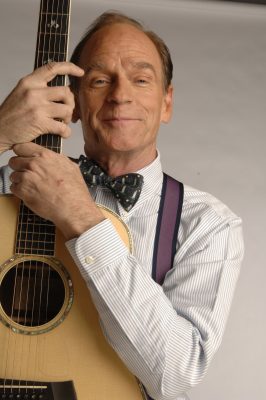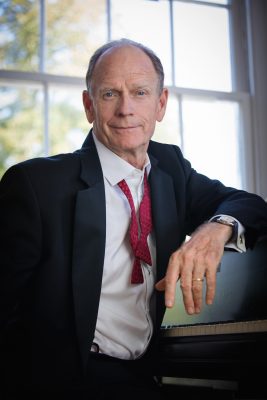For Livingston Taylor, the fault lies in our stars.
“You’ve got to have a lot of things going right to be a successful pop artist,” said Taylor, a singer-songwriter, folk artist, television personality, pilot, sailor, author and music professor. “You need to not only be good, but you have to have the temperament—and you have to have a favorable celestial alliance that puts you there.”
For Taylor and his famous siblings—sister Kate, brothers Alex, Hugh and James–the latter being the guy all boomers and most GenXers called ‘JT’ long before Justin Timberlake was born—it was a matter of being born in the right place at the right time.
“There was a lot of music when I was growing up—it really was a musical cauldron,” recalled Taylor, who was born in Boston and spent his childhood in North Carolina, where his dad was dean of UNC Chapel Hill’s medical school. “The other thing, it’s important to remember, is that the ’50s into the ’60s was a fairly dynamic musical time—the stars had aligned. In the early ’60s, multi-track recording became available and all of a sudden, all kinds of people were able to be in the popular music environment. It was wild; there was just a lot of music around.”

Some of it was coming from Taylor himself. Before the Beatles arrived in America, he had booked his first gig, singing with a couple of buddies. “I remember playing at a country club, getting paid $20 or something and thinking to myself ‘Whoa—this is good news!’” Taylor laughed, noting that “it was a time when parents weren’t so involved with their kids’ lives; they had their own lives to live. The instructions were clear: don’t get pregnant, don’t get killed.”
The young musician did neither, opting instead to make his first record, 1970s “Livingston Taylor,” with Jon Landau, the young producer who had worked with Jackson Browne and would go on to a world-changing career with Bruce Springsteen— “arguably the best management-artist career ever.
“Jon and I were wired-up kids looking to make our mark someplace,” Taylor recalled, the joy seeping out of his voice at the memory. “Jon was an energetic, curious, talented, enthusiastic guy. He’s lost none of that as the years went on.”
Back in the heyday of singer-songwriters, “we could be around one another, influence one another, be in the same space, the same ‘swimming pool,’ and compete with one another—that’s what makes great art. You have to have talent, and somebody has to pay for it.
“No question that the infrastructure of record companies and the corresponding revenue stream they controlled allowed them—elders—to concentrate young, talented people and then have the outlet, in the distribution channel, for their ferocious creativity.
“Great art is the result of wealth concentrating talent,” he added, pointing out that the studio system of the late ’60s and early ’70s, with its hierarchies and gatekeepers, was an excellent method for mining the gold of talent and creativity. “You had these record companies with the wealth to concentrate talent and really terrific things came out of it.”
Things like “Liv” and “Over the Rainbow,” his next records, and 1978’s “Three Way Mirror,” which marked his departure from Capricorn Records, his first label, and led to a slot as opening act for the iconic singer-songwriter Linda Ronstadt. Taylor toured and made more records, finding some chart success with “I Will Be in Love with You” and “First Time Love” and releasing the song, “Pajamas,” that he and his wife would later turn into a children’s book. But this Taylor saw the bigger picture: a creative, productive life not limited to selling recording and performing gigs.
“To this day I make music, and I practice music and I love it, but I do other things,” said Taylor, who will perform at AMP in North Bethesda on Friday night. “I’m interested in other things. Music is always the thing you get back to to keep it sane and on course, but music allows the rest of the curiosity to be fueled.”

The curiosity seems limitless. Taylor is more than a Renaissance man; he’s a lifelong learner who is unafraid to go where few laid-back singer-songwriters dare to tread. Instead of jumping on the climate change bandwagon, Taylor watches the science closely, offering facts and statistics, staying curious and open to every option—even studying nuclear physics to better understand the properties of uranium and plutonium.
“To me, you don’t get to say, ‘Burning coal is bad, let’s do something else!’” he said. “What are you going to do, and what is your responsibility to learn about it, and understand what your options are? This isn’t to say nuclear power is the answer, but before you rule out anything, don’t you have to understand it?”
Using less energy, storing solar and wind power, moving battery technology forward and, yes, even looking at nukes—the mind of the musician has “always been fascinated with energy and water, two favorite subjects of mine.” For Taylor, it harkens back to his days as a young artist relying on elders for guidance, only he is the elder now. And he’s not about to let himself and his fellow elders off the hook.
“My interests go into areas like this,” he explained. “My generation is known for a no-nukes stance; they’re also known for consuming everything they produced and now consuming everything their children, grandchildren, great-grandchildren will produce. My generation is guilty of plenty of poor ideas.”
The next generation, though, can learn from their mistakes. “I’m not an activist,” he said. “I don’t have children. That allows me to be a teacher, to observe what you do with no particular skin in the game. You want to burn hydrocarbons? It’s your problem, not mine. It might make me sad, break my heart, but if you’re concerned about global warming, get educated about it.”
And getting educated is what it’s all about. Taylor started teaching at Berklee College of Music in 1989, and being a professor suits him. “Oh, I’m a real contrarian,” he laughed when this reporter described him as a provocative lecturer. Which he is, but he has a soft spot for his audience, whether it’s students, concertgoers or a rapt feature writer.
“It is always interesting to watch the ripple you made when you were a drop of water in the center of the pond,” he said. “To watch that ripple travel to the edges: it loses intensity, it loses power. So, what happens is that you just watch the transition take place. I’m comforted just to observe, and to be enthusiastic about the journey of those who are coming along.
“As I’m fond of saying to my students: ‘I do not know more than you. I’ve simply lived longer than you. I’ve just seen more, that’s all.’”
Livingston Taylor will perform at 8 p.m. Friday at AMP by Strathmore, 11810 Grand Park Ave., North Bethesda. Tickets are $30 to $40. Call 301-581-5100 or visit www.ampbystrathmore.com.
Learn more about this performance on CultureSpotMC here.